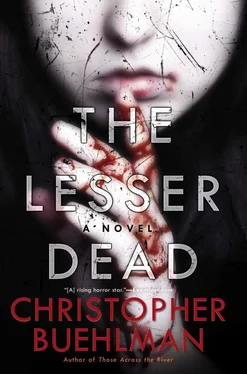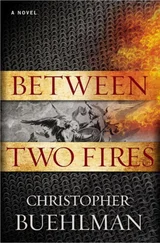“Vampires?”
“Is it a question you’re askin’ me, or are you tellin’ me your own thoughts?”
“Vampires, I think they were vampires.”
I was sitting on the old refrigerator that served me as a coffin, avocado green and covered with magnets. I collect fridge magnets. Snoopy lying on his doghouse is my current favorite. Did I mention I used to have a dog?
Margaret crouched on her heels in that weird third-world way so she looked like a witch in want of a pot, her tangled, ratty, browny-red hair spilling over her shoulders in an open challenge to all combs. On this particular evening she was wearing her second-favorite outfit, a faded, flowered housedress that had clearly been bled on repeatedly, and a pair of thong sandals. Most vampires avoid sandals because our veins are more pronounced, especially in our extremities—our feet aren’t that attractive. Margaret just didn’t give a shit.
Cvetko was looking at her in that lovelorn way he has of looking at any woman over thirty who talks to him for more than thirty seconds. Margaret looked like a dishrag-pretty thirty-five, sassy in that using-a-rolling-pin-as-a-weapon way, big blue eyes made for being bloodshot, made for anger, the kind of woman who would stab a drunk husband in the gut with a meat fork and never interrupt her lecture. Sorry, did I say “would stab”? Make that “did stab.” I think that was in 1930 or so; he survived that but was probably as dead as James Joyce by now.
Margaret charmed better than anyone except maybe me. No, she was better than me. There’s a lot of variation with us—some guys can barely do it to a drunk; some, and this is rare, can charm a whole room. Margaret wasn’t quite like the last kind, but she could really operate one-on-one. She could tell you to cut your own throat with a soup can lid and you’d do it and hope you hadn’t pissed her off by being too slow about it. She was completely brazen. I watched her get into a limo behind a woman in minks, tell the driver to keep it running and roll up the windows. Three minutes later she climbed out still checking her face in her compact and the limo drifted off slowly, hit a cab. The cabbie was screaming at the limo driver, but he just drooled and said he was sorry. Mink woman got out, confused, went to light a Virginia Slim, then barfed on everybody’s shoes and sat back down. Margaret must have tapped her for a good quart. Would have joyfully killed her if she’d had more privacy, and if we didn’t have rules about killing. I think Margaret bends her own rules sometimes, though. Margaret hates rich people.
Did I mention I used to be a rich person?
I had better do this now.
Margaret McMannis came to work as a cook in my father’s house, our narrow, four-storied Greenwich Village town house, in the spring of 1933, when I was fourteen years old. The last cook, Vilma, a chubby Hungarian woman with a birthmark like a sunburn on about a third of her face, had been like an adopted mother to me since my own mother was always busy with shopping, organizing parties, and charity work that involved little charity and even less work. Children were for cooks, teachers, and nannies to worry about. She was the kind of woman who would wear shoes she knew would give her a blister to Central Park just so she could buy shoes that would give her a blister somewhere else and pick up a third pair a block and a half from home. Because she couldn’t be bothered to carry two boxes, she would toss the first pair in the trash. The family money was mostly hers, her dad was big in textiles, but still.
Is it any wonder I ended up selfish?
Vilma never thought I was selfish. Vilma taught me spices, tarragon and paprika and rosemary, coriander, too. Vilma let me taste brandy and eau de violette; she made lemon cookies and shortbread and gingerbread men and cupcakes and when I remember the sun I remember it coming in the kitchen window with Vilma bending down to put a wooden spoon slathered in batter to my mouth, calling me Joey-bird.
“You want taste, Joey-bird? You come taste!”
Her English always sucked. I miss Vilma like I miss nobody else in this world and I don’t even know what happened to her after what happened with us. I’ll get to that.
Dad wasn’t bad when he noticed me. Always seemed genuinely interested in what was going on in school, what have you, bought me a Yorkshire terrier over my mother’s protests about hair getting on her dresses. Any dad anywhere can get a get-out-of-jail-free card for about three years by buying his kid a dog. The Yorkie’s name was Solly, but you don’t give a shit. Other people’s dogs are boring. Suffice it to say that a dad, a cook, and a dog can just about make up for a mom.
I didn’t mean to turn this into a headshrinker’s couch or anything, but it feels good to get this stuff about my mother off my chest. It isn’t like her family was bad. Her sister Golda had been a nurse in World War I and she came to see me when I had chicken pox and told me stories and I remember praying to God asking why she hadn’t married my dad instead. That sounds rotten, and kids can be rotten, but just wait.
My mom, as it turns out, got this idea that my dad was sweet on Vilma. More than just sweet on her. Not the sort of thing you called a family meeting about in 1933, but I heard them fight. I couldn’t make out everything through the walls, but I picked out enough to know (a) my mom could have married any one of about ten thousand handsome, successful Ashkenazi in Manhattan, (b) my dad planned to poison Mom, run off with Vilma, and leave little Joseph an orphan, and (c) my mom was nuts. Just fucking nuts. First off, Vilma wasn’t exactly Miss Rheingold; she was chubby and huggy and sweet, yes, but my mom was a svelte, well-put-together woman who looked good in a tweed peacoat, got plenty of looks in the park, blistered feet, crazy eyes, and all. Second of all, my dad, Edwin Davison Peacock, was a rock. Worked all day in a fever of Presbyterian capitalistic mysticism, yes, expected roast beef and mashed potatoes with lots of butter on the table at seven sharp, nothing unusual about that back then. Kept us treading water in the crash of ’29 without help from the in-laws because he was suspicious of the market—that whole buying-on-margin thing smelled like rotten meat to him long before it gave the whole country a bellyache. Pops invested in real estate, sold his Lower East Side pushcarts before La Guardia outlawed them, and modernized his three clothing stores so they looked airy and full of light when everybody else’s discount stores looked like you were looting somebody’s basement. But having an affair? I’d have been less surprised to hear FDR won a silver medal jumping hurdles.
Then it happened. My dad, respected by employees and feared by competitors, chickened out before his raving wife. He up and fired Vilma. Did it while I was at school so there’d be no tearful good-byes, but there were tears all right. I didn’t sleep for a week, just punched my pillow while Solly soldier-crawled on his belly squinting and licking his nose, trying to get close enough to lick the tears off of my cheeks, which I finally let him do. He was good at that. We just don’t deserve dogs, do we?
Leah Peacock wasn’t about to cook her husband’s meals just because that “liver-colored Magyar cow had gone back to Budapest,” so the cook interviews began immediately. Based on one plate of Salisbury steak, an enthusiastic recommendation from her last employer, her strict Catholic values, and her thin, un-Vilma-like frame, Margaret McMannis won out over the other applicants. I think, too, that her Irishness appealed to some charitable impulse of Leah’s without fully rousing her under-the-surface bigotry, as the dark faces of the two colored candidates doubtless had. The maid, Elise, was colored, but she didn’t touch food. Yeah, racism’s like that. It wasn’t the bus seats that got all the rednecks worked up in the ’50s. It was the water fountains. As for the situation in the Peacock house, however, Mother actually seemed to like Margaret Evelyn McMannis.
Читать дальше












